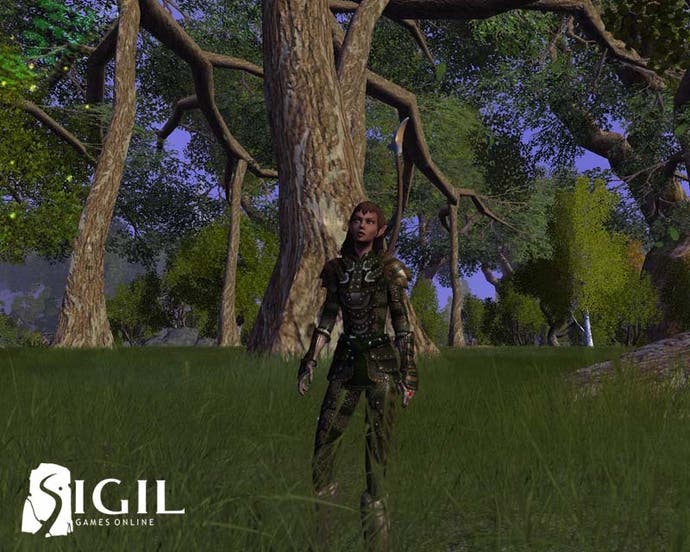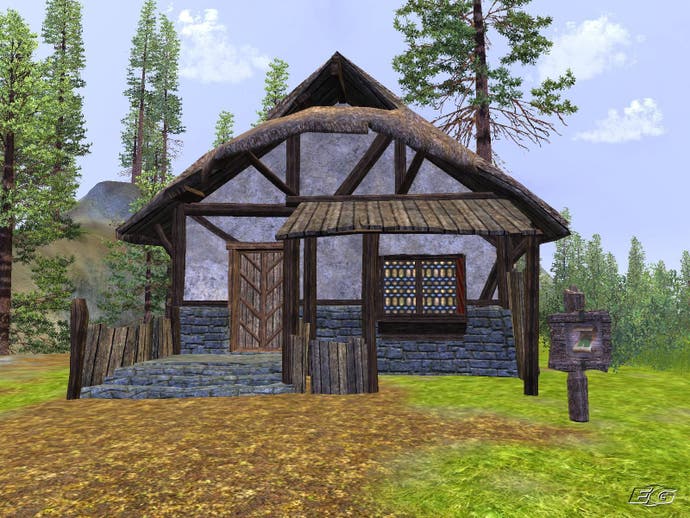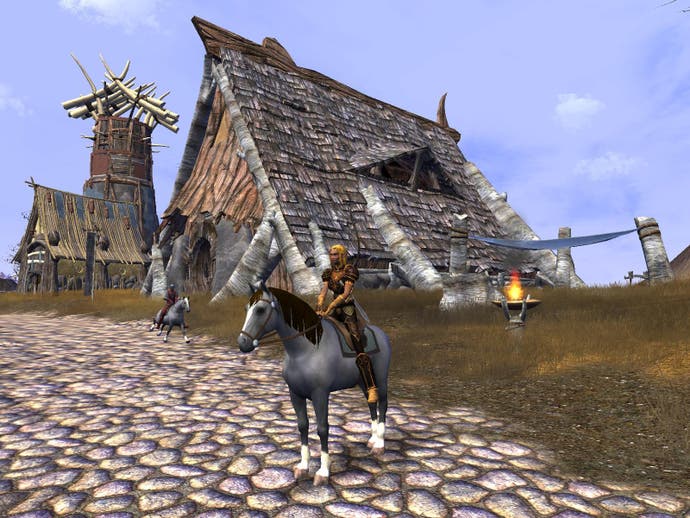Return to Vanguard
A second look at Sigil's unfinished symphony.
Last time we looked at Vanguard: Saga of Heroes, it was in a somewhat lamentable state of affairs. Just after its launch nine months ago, the game was a mess of bugs, dropped features, broken quests, regular crashes and system requirements no mortal man could hope to achieve. It was, frankly, a disaster.
And yet, we couldn't help but note that in spite of its disastrous implementation, Vanguard was full of good, ambitious ideas. We liked the concepts underlying such things as the diplomacy system, which allows you to treat conversations with NPCs as a kind of card game, and the excellent crafting system. We liked the idea that we could build our own houses or even boats; we liked the combat system, whose chained attacks and clever manipulation of resistances made most other MMOG combat look staid and boring.
The problem, back in February, is that these concepts were like rough-hewn gemstones being carried along in a river of human excrement. Vanguard was so utterly, painfully broken, both technically and in some key design ways, that reaching for its finer moments was like sticking your fingers into a leper's weeping sores to extract a nugget of gold. Other equally pleasant metaphors spring to mind. I'll spare you.
Shored Up

In February, we gave Vanguard six out of ten - a score that, in retrospect, was probably a little generous given the shocking mess the game was in. Shortly afterwards, Sigil Games CEO Brad McQuaid (he of EverQuest fame) admitted that the game had been released unfinished due to financial constraints, and probably needed another three months in development before it was up to scratch.
Well, fair enough. Sigil - now wholly owned by publishers Sony Online Entertainment - have now had nine months to work on the game. As we observed in our original review, MMOG titles change and evolve in a manner unmatched by any other type of game. If our February review was a snapshot of a painfully incomplete product, then it seems only fair to return and take another snapshot.
The first sign of just how much has changed in the world of Telon comes when you install (or re-install) the game. Setting aside an evening to get back into the game turned out to be a mistake - in that the evening was spent simply installing and patching, with only a few minutes afterwards to run around and play with settings. At a rough estimate, the game took three and a half hours to install from DVD and then patch on a decent UK ADSL connection - we don't know exactly how much patch data that equates to, but it's certainly a hefty amount.
Once you're actually ready to go, however, the first difference between today and nine months ago is immediately apparent. The game works now; not in a creaky, half-baked sense, but in a way which actually makes it feel like a proper, tested, polished product. It loads in a reasonable amount of time, manages a decent frame-rate (the only major hardware change to our test rig was going from an ATI Radeon X1950 to a Radeon X2600 - a nice bump, but not enough to account for the performance boost), and doesn't crash. The view distances are fantastic, and you can even turn on a fair amount of detail without making your PC sob in horror.

Not all the graphical problems are gone, admittedly. There are some odd glitches in the system, like the fact that you can see the world being "built" around you when you first pop into an area - an effect that will be familiar to anyone who has dabbled in Second Life, but not one we expect to see in a properly polished online world. It's a minor irritation; more unusual, and more annoying, is the bug which makes walls, platforms or entire buildings disappear on rare occasions. You'll need to log out and back in to fix that one.
Still - the contrast between what we're seeing right now and what we saw nine months ago is like night and day. Lag is rarely a problem (although the sparsely populated servers may have some impact on that), the game seems perfectly stable for the most part, graphics glitches are rare, albeit still present. Vanguard finally works, and there are even moments when some hugely impressive graphics really shine through.
Emboldened by the obvious technical progress, let's explore a little more deeply.
Scratching the Surface

Most of the things we liked about Vanguard have stayed in place in the past nine months, we were pleased to note. The combat remains the stand-out part of the game, thanks to the addition of special chaining and finishing attacks that are triggered by critical hits. You start picking up these moves early on, and they gradually stack up to make combat quite different to anything you've experienced in an MMOG before. Other titles tend towards repetitive battles; learn a pattern of buffs, attacks and other actions, and repeat it until the enemy falls. Vanguard breaks the rules by making you watch which actions are available to you, giving combat an intensity which anyone bored by other MMOGs will welcome.
Diplomacy, too, is still here - and greatly improved over its first incarnation, thanks to a much slicker user interface for diplomacy "matches" and a more logical progression system which awards you a level in diplomacy in the same way that you might level up in combat. Disappointingly, diplomacy remains somewhat divorced from the game's main content; it's got its own quest lines and NPCs, rather than being an alternative way of solving adventuring situations and quests. At high levels, Sigil is working to make diplomacy useful, at least - skilled diplomats are needed to do some very high end things like securing permission to build Guild Halls.
Finally, the third "sphere" of Vanguard's activities, crafting, is one of the least tweaked aspects of the game - but that's because it wasn't terribly broken to begin with. All manner of bugs and imbalances have been ironed out, and the interface seems a bit slicker and more intuitive - but the underlying system is still the same. Manufacturing items is a multi-step process which occasionally throws up "complications" (some good, most bad) that you can either try to resolve, or just live with and see what happens. It's a refreshingly involved system compared to the usual "combine recipe and ingredients, over and over" crafting abilities in MMOGs.









